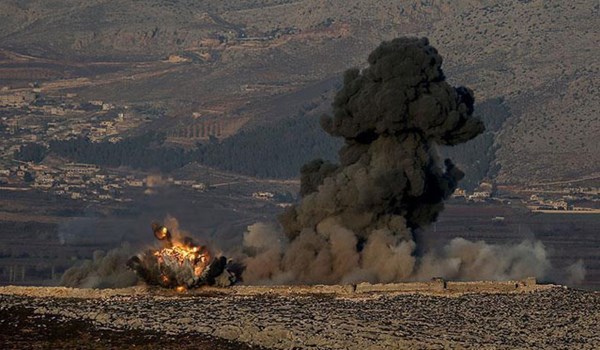
RNA - Here in Syria they were once allied with the United States to affect regime change in Damascus. Now that they have failed on that front, they all find themselves being ignored and bombed by the Pentagon regime. This trend stretches from America’s first wars on Afghanistan and Iraq to the present day conflicts in the Middle East, Syria in particular.
In Syria, various terrorist groups and mercenary regime-change proxies have been double-crossed, betrayed, and stabbed in the back by Washington so many times that what’s going on in Afrin right now can hardly be called a coincidence anymore. With this long list of broken alliances, it is blatantly obvious that betrayal is an established tactic of the United States:
There are numerous pictures of Saddam Hussein shaking hands and hanging out with high-ranking US politicians like George Bush Sr. and Donald Rumsfeld. Saddam was once a very important ally to Washington and their presence in the Middle East. During the 1980s, Iraq’s neighbor Iran was a very serious threat to the US interests in the region. American politicians knew full well of Saddam’s dictatorial style of governance and psychopathic love for chemical weapons like anthrax. They funded him anyway because Iran was more of a threat, and they also supplied him with satellite images that he used to target Iran. Later, Saddam invaded Kuwait, which resulted in the US fighting against Saddam in the Persian Gulf Wars. In 2003, the US invaded Iraq, Saddam was found in a ditch, and was later hung.
In 2001, the same thing happened to Osama Bin Laden, who was initially a US ally. It all started back in the 80s, when the Soviets were in Afghanistan, fighting and attempting to take over the country. The CIA devised a plan to fund and arm terror Arab groups known as Mujaheddin. Osama Bin Laden was strong leader of these groups during the Soviet invasion, and he himself was trained directly by the CIA, and received weapons and money from the US and Saudi Arabia. Bin Laden was once seen as a freedom fighter, and “good guy” fighting to kick out the evil communists. Years later, this one time ally of the United States was hunted down and assassinated.
Right now the same story of American treachery and deception is happening to the Syrian Kurds in Afrin. US-Turkey tensions over the Turkish invasion of Afrin looks to be getting much worse, with Turkey’s Deputy Premier Bekir Bozdag warning that the US is the one risking confrontation by verbally supporting the Kurds. Bozdag has warned the US needs to “review its soldiers and elements giving support to terrorists on the ground,” and that US forces who continue to support the Kurdish YPG, which Turkey considers terrorists “will become a target in this battle.”
The irony here is that Turkey has also been stabbed in the back by the US – just like America’s Kurdish allies who criticize Washington for not stopping Turkey from attacking them in Afrin. The US denies vehemently any involvement in the recent coup attempt in Turkey, where certain parts of the military and the population itself turned against the government. Turkey is still accusing the US of harboring Muslim cleric Fethulla Gulen, the supposed mastermind behind the coup who lives in Pennsylvania. The US refuses to extradite the cleric to Turkey, amidst straining relations.
Turkish President Recep Tayyip Erdogan has also demanded evidence that Washington was not behind the coup, evidence it has yet to receive. It’s still unclear what exactly happened, but when you look back at the lost list of allies that the US has deceived, back-stabbed, and betrayed, it’s not hard to guess who was behind Turkey’s failed coup and why Ankara has decided to attack Kurdish separatists in Afrin.
It all boils down to this: The Syrian Kurds need Damascus to survive – not Washington. The US will do nothing to protect its so-called Kurdish allies against invasion by its NATO partner Turkey - though it has advised Ankara to avoid unnecessary collateral damage. In the words of Secretary of State Rex Tillerson, “Just try to be precise, try to limit your operation, try to show some restraint, let us see if we can work with you to create the kind of security zone you might need.”
The military operation initiated by Turkey in Afrin is bad news for the Kurds. They are the biggest losers of this new game, because just like their Iraqi Kurdish counterparts they will fail to secure an alliance to protect them and stand by their separatist goals, despite offering themselves as suitable allies of the US, Israel and Saudi Arabia to consolidate Washington’s position and occupation over a part of Syria. An alternative is for the Kurds in Afrin and elsewhere to kick out Americans from their cantons hand over the control of the security and the financial administration to Syrian representatives and officials so the Turkish attack on the entire province and the nearby cities under Kurdish control can be halted.
847/940